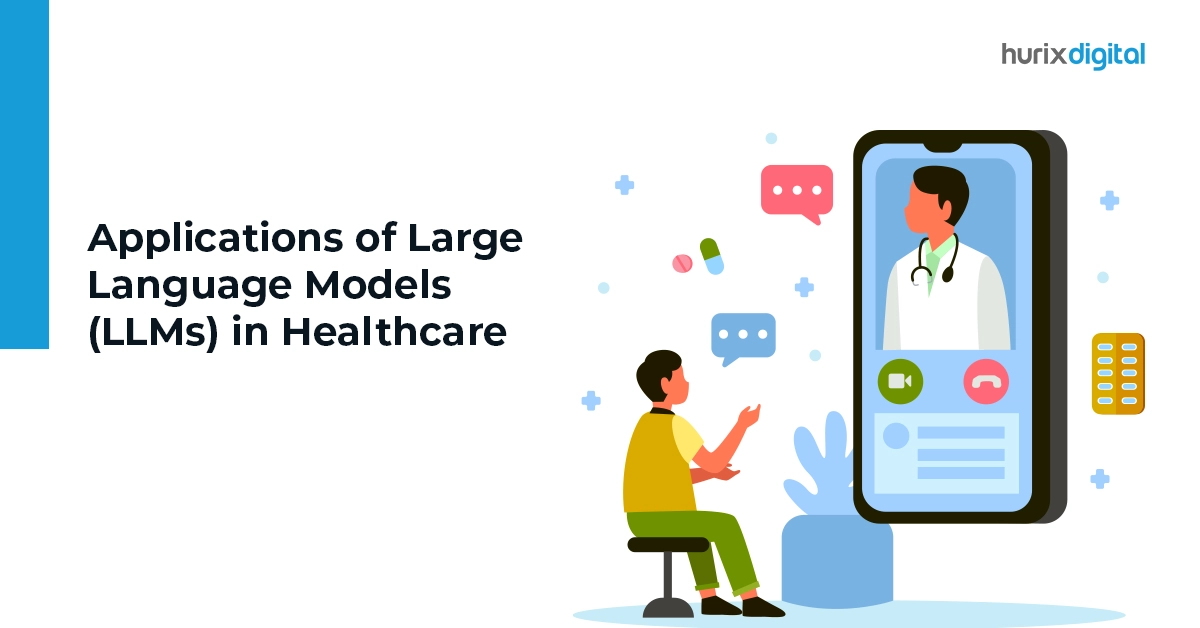Applications of Large Language Models (LLMs) in Healthcare
When it comes to healthcare, Large Language Models (LLMs) offer unparalleled potential to streamline processes, enhance decision-making, and ultimately improve patient outcomes.
These aren’t your average chatbots. LLMs are AI-enabled tools trained on mountains of text data, ready to entirely transform the realm of healthcare in terms of efficiency, accuracy, and innovation.
Read on as we dive deep into the exciting world of LLMs in healthcare in this post. Explore how these AI marvels are transforming telemedicine, supercharging automation, and paving the way for a future of personalized medicine that feels futuristic yet is firmly within reach. Let’s start!
Table of Contents:
Understanding Large Language Models (LLMs)
LLMs are a type of AI system trained on vast amounts of text data. This data can include books, articles, research papers, and even electronic health records (EHRs). By analyzing these vast datasets, LLMs learn complex relationships between words and can perform a variety of tasks, including:
- Text generation: LLMs can generate human-quality text, translate languages, and write different kinds of creative content.
- Question answering: LLMs can answer your questions in an informative way, even if they are open-ended, challenging, or strange.
- Information retrieval: LLMs can sift through massive amounts of data to find relevant information.
LLMs’ ability to process and understand vast quantities of healthcare data positions them as game-changers in the medical field.
When it comes to healthcare, their proficiency in processing vast amounts of data opens doors to revolutionizing medical research, enhancing diagnostics, personalizing treatment plans, and, ultimately, improving patient care and outcomes.
Additionally, Large Language Models (LLMs) can assist healthcare professionals in staying updated with the latest medical literature, trends, and guidelines, aiding in evidence-based decision-making and ensuring the delivery of high-quality care.
Moreover, their capacity for natural language understanding facilitates seamless interaction with patients, which enhances communication and patient engagement throughout the healthcare journey.
Also Read: How AI is Revolutionizing Healthcare Education and Training
Healthcare Applications of LLMs
LLMs hold immense potential to revolutionize various aspects of healthcare. Here are some key areas where LLMs are making significant strides:
1. Transforming Telemedicine Advancements
Telemedicine, the use of telecommunications technology to deliver healthcare services remotely, has seen a surge in popularity. LLMs can power virtual assistants that answer your questions 24/7, schedule appointments with ease, and even translate languages in real time during consultations.
Imagine a doctor in London seamlessly connecting with a patient in Tokyo – that’s the borderless world LLMs can create. It can further enhance telemedicine by:
1. Virtual Assistants
LLMs can power virtual assistants that can answer patients’ questions about symptoms, medications, and appointments. These AI assistants can also schedule appointments and provide basic triage support.
2. Real-Time Language Translation
LLMs can bridge language barriers during teleconsultations, ensuring clear communication between patients and healthcare providers from different backgrounds.
3. Sentiment Analysis
By analyzing a patient’s tone and language during a teleconsultation, LLMs can identify potential concerns or emotional distress, allowing healthcare providers to offer better support.
2. Empowering Healthcare Automation
The administrative burden on healthcare professionals is a significant challenge.
Administrative tasks that bog down healthcare professionals can be banished with LLM. Medical coding, appointment scheduling, and report generation can all be automated, freeing up valuable time for doctors to focus on what matters most: patient care. It can automate various tasks, freeing up valuable time for patient care.
Here’s how:
1. Medical Coding and Billing
LLMs can analyze medical records and automatically generate accurate medical codes and billing documentation, reducing errors and streamlining the billing process.
2. Appointment Scheduling
LLMs can power intelligent chatbots that can schedule appointments based on patient availability and provider schedules, improving efficiency and reducing wait times.
3. Report Generation
LLMs can analyze patient data and generate preliminary reports, summarizing key findings and suggesting potential diagnoses, saving doctors time and allowing them to focus on more complex cases.
3. Revolutionizing Personalized Healthcare
The future of healthcare lies in personalization. LLMs can analyze a patient’s medical history, genetics, and lifestyle to craft personalized treatment plans. Think of it as a magic potion brewed specifically for your unique needs.
These AI marvels can also power chatbots that remind you about medications and offer mental health support, ensuring you stay on the path to wellness. It can contribute to this shift by:
1. Extracting Insights from Patient Data
LLMs can analyze a patient’s medical history, genetic data, and lifestyle information to identify personalized risk factors and develop tailored treatment plans.
2. Chatbots for Medication Adherence
LLMs can power chatbots that can remind patients about their medication schedules, answer questions about side effects, and provide educational resources, promoting better medication adherence.
3. Mental Health Support
LLMs can be used in chatbots or virtual assistants that offer basic mental health support, offering empathetic responses, resources for coping strategies, and guide users to appropriate professional help when needed.
4. Fueling Healthcare Innovation
Drug discovery can be a slow and arduous process. Enter LLMs, the research assistants extraordinaire. By analyzing vast datasets of scientific research, they can identify potential new drugs and therapies, accelerating the journey from lab bench to bedside.
Clinical trial design and medical research can also benefit from the analytical prowess of LLMs, paving the way for breakthroughs in all areas of healthcare. They are accelerating the pace of healthcare innovation by:
1. Drug Discovery
LLMs can analyze vast datasets of scientific research to identify potential new drugs and therapies, accelerating the drug discovery process.
2. Clinical Trial Design
LLMs can analyze past clinical trial data to optimize future trial designs, making them more efficient and effective.
3. Medical Research Support
LLMs can assist researchers by analyzing vast amounts of medical literature, identifying research gaps, and suggesting new areas of investigation.
Also Read: How to Create a Better Training Strategy for Your Healthcare Organization?
Final Note
LLMs are not a replacement for human expertise but rather powerful tools that can augment the capabilities of healthcare professionals.
With their ability to analyze vast amounts of data, personalize care, and break down communication barriers, LLMs are poised to augment healthcare transformation, ushering in a new era of patient-centric care.
In this regard, you can team up with Hurix Digital to utilize the full potential of LLMs in your healthcare practice. Our experts collaborate closely with you, helping you integrate LLMs seamlessly into your workflows for optimized efficiency and enhanced patient outcomes.
Connect with us for further information.

Performance, Results, Growth, and Life-Long Learning define my professional life. I am passionate about making workplace learning planful, purposeful, and impactful. I take pride in partnering with clients and bringing them the best in learning design and creating solutions that address business challenges.









